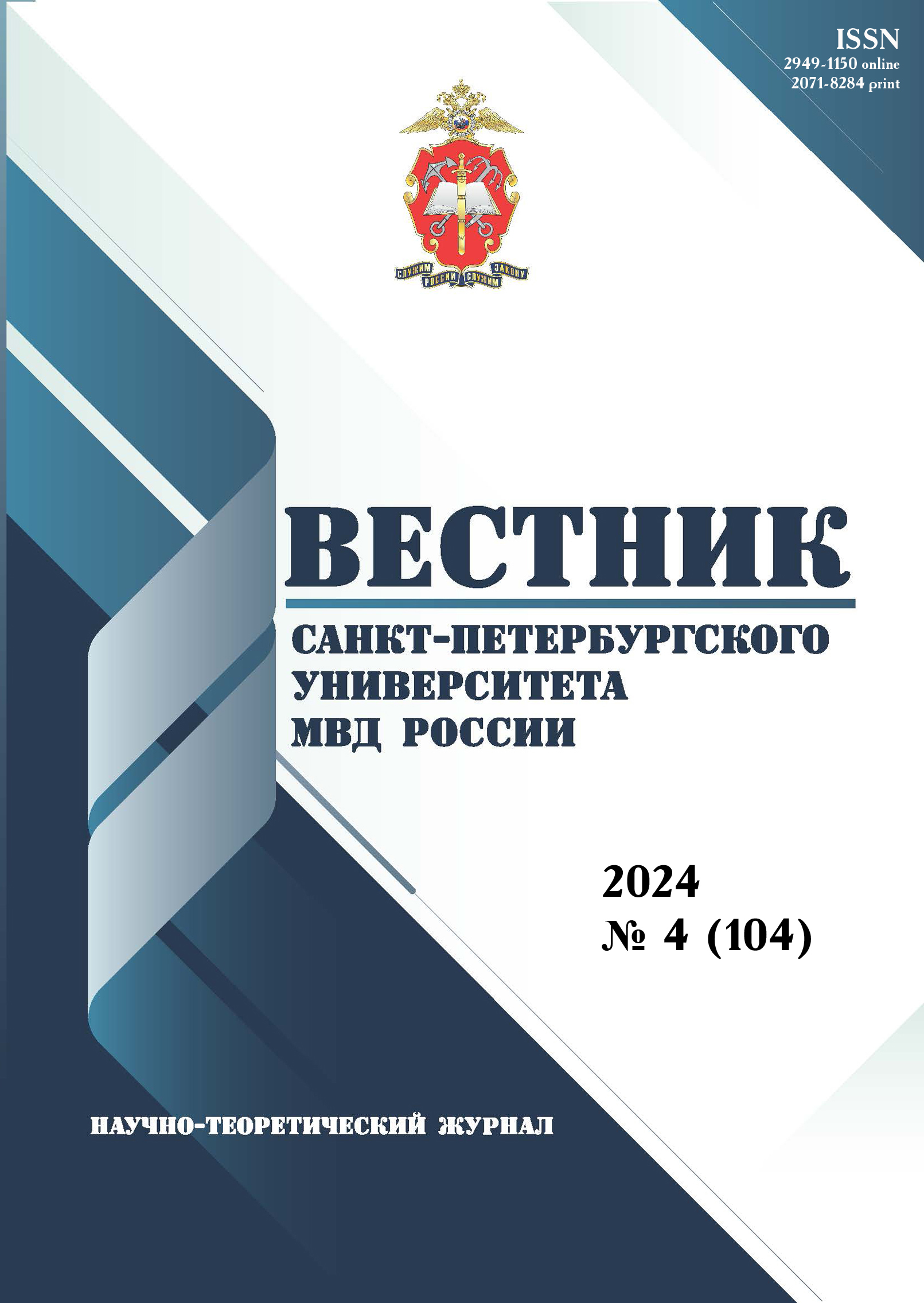Moscow, Moscow, Russian Federation
UDC 159.9
CSCSTI 15.81
Russian Classification of Professions by Education 37.05.02
Russian Library and Bibliographic Classification 884
Russian Trade and Bibliographic Classification 7503
Introduction. One of the forms of citizens' participation in the life of society and the state is volunteer activity. The relevance of the problem of extreme volunteerism is largely due to the need to ensure national security, integrate new regions of the Russian Federation, and protect state interests during a special military operation. However, the extremity of activity potentiates the development of professional personality deformation. Methods. To study the relationship between personal choice of participation in volunteerism and the severity of manifestations of professional deformation, the following methods of data collection and processing were used: questionnaires, psychological testing using author's methods (questionnaire for assessing manifestations of professional personality deformation, methodology for evaluating the choice of participation in extreme volunteerism), descriptive statistics, correlation analysis, assessment of the reliability of differences as processing methods. 90 people participated in the longitudinal study. The results of the study: it has been established that professional deformation in extreme volunteers manifests itself in the form of communicative jargon and hyperorganization. Staying in extreme conditions can potentiate imperativeness and personal rigidity. The acceleration of professional transformation is determined by the nature of extreme co-participating activities. Such components of the valuesemantic sphere of personality as motivation and interest in volunteerism, the integrity of the worldview, voluntary sense orientation, and prosocial value orientations have a protective effect. Personal choice of participation in extreme volunteerism as an integral characteristic makes it possible to overcome pseudo-activity and reduction of professional responsibilities. The material is aimed at improving the psychological support of extreme participating activities, substantiating the need and directions of psychoprophylactic work with volunteers and representatives of law enforcement agencies.
extreme volunteerism, personal choice, complicity, motivation, protector, extremity, professional deformation
1. Ayubov E. N., Buevich O. E., Novikov O. N., Peregudova N. V. Osnovnye aspekty privlecheniya dobrovol'cev (volonterov) pri likvidacii chrezvychaynyh situaciy // Tehnologii grazhdanskoy bezopasnosti. – 2023. – T. 20, № 1 (75). – S. 99–106; https://doi.org/10.54234/CST.19968493.2023.20.1.75.
2. Petrov V. E. Psihologiya ekstremal'nogo volonterstva: sub'ektnaya model' i diagnostika : monografiya. – Moskva: Sputnik +, 2024. – 96 s.
3. Zabegalina S. V., Chigar'kova A. V. Adaptivnye i prognosticheskie sposobnosti v strukture povedencheskih i kognitivnyh osobennostey lichnosti voennosluzhaschego // Psihopedagogika v pravoohranitel'nyh organah. – 2016. – № 1 (64). – S. 29–33.
4. Golovanova E. I. Special'naya leksika voennoy sfery v sovremennom kommunikativnom prostranstve // Lingvistika i obrazovanie. – 2024. – T. 4, № 2 (14). – S. 37–45; https://doi.org/10.17021/2712-9519-2024-2-37-45.
5. Lupanova E. V. Frazeologizmy voennoy tematiki kak otrazhenie social'nyh otnosheniy voennosluzhaschih // Prepodavatel' HHI vek. – 2017. – № 4-2. – S. 364–372.
6. Bikchintaeva L. G. Psihologicheskie determinanty professional'nyh destrukciy v deyatel'nosti sotrudnikov organov vnutrennih del // Vestnik Ufimskogo yuridicheskogo instituta MVD Rossii. – 2014. – № 1 (63). – S. 41–48.
7. D'yachkova Yu. E. Deyatel'nostnye faktory professional'noy deformacii psihologov pravoohranitel'nyh organov // Nauchnoe obespechenie sistemy povysheniya kvalifikacii kadrov. – 2014. – № 3 (20). – S. 17–20.
8. Sal'nikov I. S., Izosimova S. A., Piguz V. N., Ivashko K. S. Analiz i sistematizaciya processa social'noy adaptacii lyudey, postradavshih ot hronicheskogo stressa voennogo vremeni // Teleskop: zhurnal sociologicheskih i marketingovyh issledovaniy. – 2024. – № 2. – S. 6–12; https://doi.org/10.24412/1994-3776-2024-2-6-12.
9. Korneeva Ya. A., Zelyanina A. N., Martirosova N. V. Osobennosti professional'noy lichnostnoy deformacii sotrudnikov OVD, FSIN i FSSP // Gigiena i sanitariya. – 2022. – T. 101, № 4. – S. 389–397; https://doi.org/10.47470/0016-9900-2022-101-34-389-397.
10. Rastyapina Yu. Yu. Professional'naya deformaciya sotrudnikov OVD // Vestnik Moskovskogo universiteta MVD Rossii. – 2012. – № 9. – S. 157–162.
11. Rassoha A. A., Zlokazova M. V., Solov'ev A. G., Ichitovkina E. G. Dinamika lichnostnyh osobennostey pensionerov-kombatantov Ministerstva vnutrennih del i ih vzaimosvyaz' s formirovaniem psihicheskih rasstroystv // Vyatskiy medicinskiy vestnik. – 2024. – T. 82, № 2. – S. 44–49; https://doi.org/10.24412/2220-7880-2024-2-44-49.
12. Zubova L. V., Aptikieva L. R. Psihologo-pedagogicheskoe issledovanie professional'nyh destrukciy lichnosti u sotrudnikov pravoohranitel'nyh organov // Vestnik Orenburgskogo gosudarstvennogo universiteta. – 2022. – № 3 (235). – S. 27–37; https://doi.org/10.25198/1814-6457-233-27.
13. Machul'skaya I. A., Belyaev R. V., Mashin V. N. Fenomen emocional'nogo vygoraniya voennosluzhaschih v processe ih professional'noy deyatel'nosti // Territoriya nauki. – 2015. – № 5. – S. 72–77.
14. Fomenko G. Yu., Kuasheva E. R. Lichnost' kak sub'ekt razresheniya protivorechiy v ekstremal'nyh vidah deyatel'nosti / Lichnost' i bytie : chelovek kak sub'ekt sociokul'turnoy real'nosti : materialy Vserossiyskoy nauchno-prakticheskoy konferencii, g. Krasnodar, 9–10 sentyabrya 2016 g. / pod red. Z. I. Ryabikinoy, V. V. Znakova. – Krasnodar: Kubanskiy gosudarstvennyy universitet, 2016. – S. 188–192.
15. Scherbakova V. V. Deformaciya motivacionnoy sfery lichnosti voennosluzhaschego // Aktual'nye problemy gumanitarnyh i estestvennyh nauk. – 2013. – № 6. – S. 372–374.
16. Clary E. G., Snyder M. The motivations to volunteer: Theoretical and practical considerations // Current directions in psychological science. – 1999. – Vol. 8, № 5. – R. 156–159; https://doi.org/10.1111/1467-8721.00037.
17. Fedotov A. Yu., Kruk V. M., Alekseev D. E. Funkcional'naya nadezhnost' kak samostoyatel'naya mezhdisciplinarnaya problema. Sovremennye metody ee ocenki, sohraneniya, ukrepleniya i vosstanovleniya // Psihologiya i pedagogika sluzhebnoy deyatel'nosti. – 2021. – № 1. – S. 88–93; https://doi.org/10.24412/2658-638X-2021-1-88-93.
18. Ovsyanikova E. A., Savel'eva I. V., Dolzhenko N. I. Psihologicheskaya kul'tura lichnosti kak faktor preduprezhdeniya professional'noy deformacii // Pravo i sovremennye gosudarstva. – 2013. – № 6. S. 28–33; http://doi.org/10.14420/ru.2013.6.5.
19. Sharanov Yu. A., Dushkin A. S. Psihologicheskaya travmatizaciya sotrudnikov pravoohranitel'nyh organov, vypolnyavshih operativno-sluzhebnye zadachi v osobyh usloviyah // Prikladnaya yuridicheskaya psihologiya. – 2023. – № 2 (63). – S. 26–38; https://doi.org/10.33463/2072-8336.2023.2(63).026-038.














